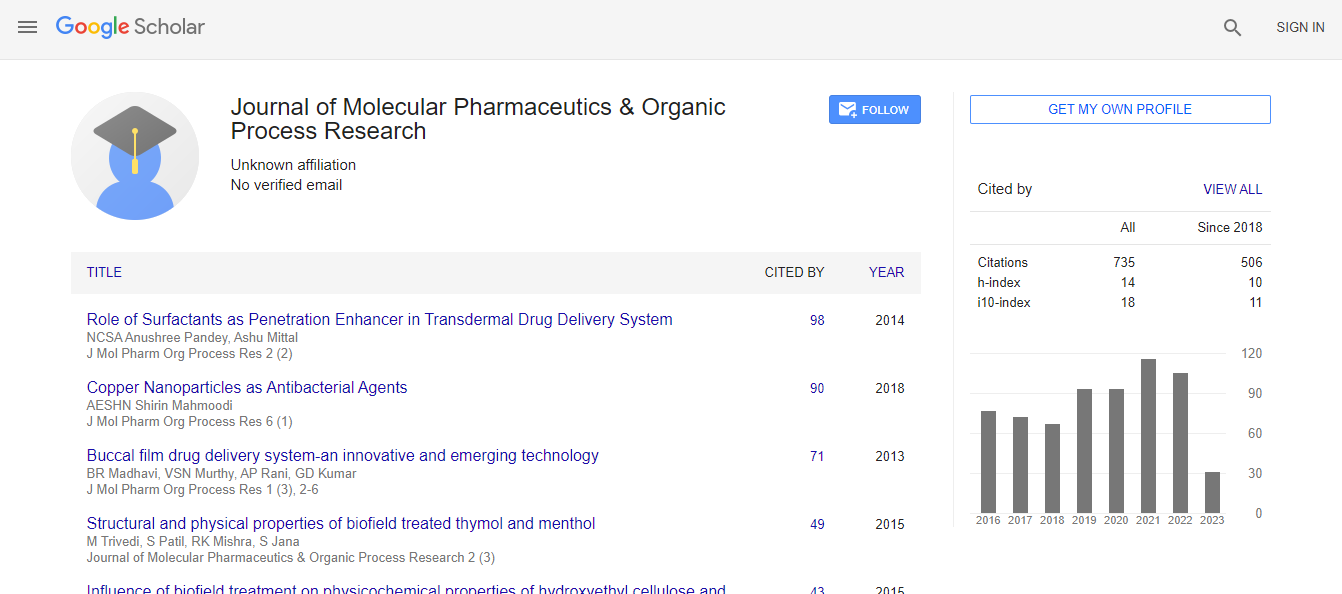Phytochemical Analysis of Alfalfa (Medicago sativa) Seed Extract by Soxhlet Extraction Using Different Solvents
Abstract
ABSTRACT
According to a recent report nearly 42 per cent Indian
kids are malnourished and stunted. The aim of our
project was to develop nutraceutical products using
alfalfa as one of the components to overcome
undernourishment particularly among women and
children. The seeds of alfalfa (Medicago sativa)
contain more nutritional property when compared with
other leguminous seeds. It contains 18.9% of protein
when compared with egg (13.1%), milk (3.3%) and
beef (16.5%). This paper reports the investigation
results of phytochemical analysis of alfalfa seed
extracts using the procedure of Sadasivam and
Manickam (2009). The presence of proteins,
carbohydrates, saponins, phenolic compounds,
alkaloids, flavonoids etc. was observed in sprouted
alfalfa seeds extracted by solvents such as ethanol,
petroleum and chloroform. The presences of proteins,
carbohydrates, saponins, alkaloids etc were confirmed
by the present investigation. Thus the cost effective
nutraceutical product containing alfalfa along with
other cereals and pulses would serve the humanity to
fight undernourishment in an easy and economical
way.
As a social concern oriented and need of the hour
development this project aims to strengthen the
population of under nourished children in India who
account for nearly 42 % as per the recent survey by
the Naandi Foundation in their Hunger and
Malnutrition (HUNGaMA) report1 . Under nutrition is
a consequence of consuming too few essential
nutrients or excreting them more rapidly than they can
be replaced. Alfalfa is a perennial plant which belongs
to the legume family-Leguminoseae. It grows up to 2-
3 feet tall and has smooth and erect stem. Leaves are
pinnately trifoliate, Flowers are purple-violet in
colour, found in racemes formand its flowering season
is June to August, and the seeds are spirallycoiled in
form. It is also called as “Father of all Plants”. Until
now alfalfa seeds are not used widely for human
consumption for increasing the nutritional level
because of the presence of canavanine sulfate. It is
most commonly used for cattle and horse feed. By
reducing the presence of canavanine sulfate by proper
laboratory methods, we can use Medicago sativa
(alfalfa) seeds for daily consumption as a good provider
of nutrition
The laboratory methods include sprouting, autoclaving,
roasting and powdering. Sprouting is a method to reduce
the canavanine sulfate from the seeds. After sprouting
the seeds were autoclaved at 121˚C, roasted and
powdered and processed for further use. After
powdering of sprouted alfalfa seeds the soxhlet
extraction was done in order to get a concentrated
extract. The extraction was done with the help of powder
of alfalfa sprouts by using three successive solvents
namely Chloroform, Petroleum Ether and Ethanol. The
recovery % of Petroleum ether, Ethanol and Chloroform
extracts were 12%, 8% and 14% respectively. With the
help of extract the phytochemical studies are done.
Phytochemical analysis of seed extracts was conducted
using the procedure of Sadasivam and. Manikam’s
(2009) methodology. By this analysis, the presences of
several phytochemicals were tested.
The iodine solution was prepared by adding iodine to
2% potassium iodide solution till the colour becomes
deep yellow. 0.5 g of the concentrated extracts of
Medicago sativa from 3 successive solvents was added
with a few drops of the prepared iodine solution2.
Fehling’s test Fehling’s reagent A: 34.65g copper
sulphate was dissolved in 500ml distilled water.
Fehling’s reagent B: 125g potassium hydroxide and
173g Rochelle salt (potassium sodium tartarate) was
dissolved in 500ml distilled water. To 1ml of Fehling’s
A, add 1ml of Fehling’s B and a few mg of the extract
which is called as the test sample. Boiled for few
minutes and noted the colour change2.
The presence of oily substance in the extracts was
determined by spot test. Few milligrams of the extract
was taken on a filter paper. The filter paper was folded
and pressed against the extract kept within. The
appearance of oily layer was observed2. Test for
carbohydrates 100mg of the extract was dissolved in 5ml
of water and filtered. The filtrate obtained was subjected
to Fehling’s test as described earlier. 0.5 ml of the
filtrate obtained from above step was boiled with 0.5ml
of Fehling’s reagents A and B2. Ninhydrin test This test
was done to detect the presence of proteins. The aqueous
filtrate if the powdered seed sample was taken. 2 to 3 drops of Ninhydrin solution was added to 2 ml of the
aqueous filtrate of the sample2.
The toxic substance canavanine sulfate from alfalfa
seeds are removed by applying some laboratory
process like sprouting, air drying, roasting and it is
made as powder by grinding for human consumption
for increasing the nutritional level. Alfalfa seeds are
not to be taken by pregnant women. Its use is
restricted to them even though in the absence of
canavanine sulfate. In the present investigation the
presence of proteins, carbohydrates, saponins,
alkaloids etc were confirmed by different extraction
methods Thus our cost effective nutraceutical products
containing alfalfa along with other cereals and pulses
would serve the humanity to fight undernourishment
in an easy and economical way. Our future studies are
to check the effectiveness of the nutraceutical
products in animal models and human volunteers.
Keywords: Phytochemical, Alfalfa, Petroleum,
Chloroform, Ethanol.

 Spanish
Spanish  Chinese
Chinese  Russian
Russian  German
German  French
French  Japanese
Japanese  Portuguese
Portuguese  Hindi
Hindi 
